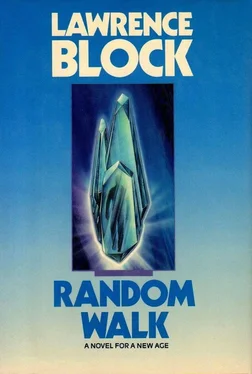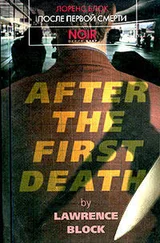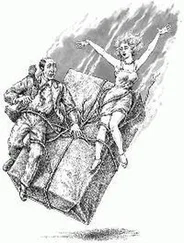Oh, heaven!
#59.
When Phil Donahue said he would be right back after this message, Mame Odegaard flicked off the set with the remote control device and carried her coffee cup into the kitchen. This was not the simple process it had once been. Mame was sixty-seven. Five years ago, which would have been some three years after her husband’s death, she had begun to be bothered by arthritis. The condition had progressed, and it was now quite severe.
She could walk, but not without the aid of an aluminum walker. She could tend for herself, but everything took longer than it used to, and was more trouble, and often involved pain. Even doing nothing involved pain — pain in her fingers, pain in her toes and ankles, pain in her knees, pain in her hips. She took Tylenol every four hours and it was easier on her stomach than aspirin, but no matter what the doctors said she would swear it wasn’t as effective as the aspirin, it didn’t get past as much of the pain. But then perhaps aspirin wouldn’t be as effective now as she remembered it, because her condition had worsened since she switched to Tylenol.
Her son wanted her to move in with him and his wife, but he worked for the government and they lived in Maryland, just outside of Washington. They had a very nice house but it was their house, not her house, and this was his second wife, he and Ruth had been divorced for some years now, and she had been real close to Ruth and just couldn’t warm up to the second wife, Stephanie. They got along all right, but a visit was a far cry from living under the same roof, and she didn’t want it.
And she didn’t want to live in a city, either. Nor did she like the idea of a retirement village in Arizona, which he kept proposing to her. There would be people around, he told her, people her own age, and she’d have activities, and the harsh winters of western Oregon would be a thing of the past. And, most important, things would be easier for her. She wouldn’t have to do so much for herself, and the heat would help her arthritis, and life would be, well, easier. Easier and better.
And it probably would, she had to agree, but it wasn’t what she wanted. She’d lived at this house beside the road for forty years, moving into it just three years after she and Karl were married. She’d birthed both her children in that house, and she’d buried her daughter from it, and her husband, too.
She could walk out her back door and be steps from the Malheur River. She could see Cottonwood Mountain from her back door, or she could stand on her front step and look at Sourdough Mountain. She had been looking at her mountains for forty years and she wasn’t in any big hurry to give them up.
She rinsed her cup in the sink and walked to her front door now, and out onto the step. She looked first at the mountain, as if to confirm that it was still where she’d seen it last, and then at her mailbox at the foot of the drive. The flag was down, which was supposed to indicate that the mailman had come. When she collected her mail she put the flag up, even if she didn’t have any letters to be picked up. Then he would put the flag down when there was mail for her, and that way she would not have to walk the hundred yards to the road for nothing. It was a long walk, and she didn’t like to make it for no reason at all.
She walked down to the road, positioning the aluminum frame, taking a step, gathering herself, moving the frame, taking a step, covering the hundred yards one small step at a time.
The box was empty. Actually this was not that surprising. Sometimes she forgot to put the flag up. For years she had only done so when she was leaving a letter, and old habits were hard to change. It was early, too, it wasn’t eleven, Donahue was still on. She almost always watched the whole of the Donahue show, and even then the mail usually didn’t arrive for another hour, so why had she even looked to see if the flag was up or down, let alone walked all the way out here?
Now she didn’t know for sure that she’d left the flag down, and she didn’t know for sure that the postman hadn’t come, since there were days when he came extra early, just as there were days when he came quite late. So either he hadn’t come or he hadn’t had any letters for her, there was no way to tell, and it didn’t much matter, since either way she’d made the trip for nothing.
Of course it didn’t hurt her to walk. Well, that wasn’t the right way to put it. It pained her some, but it was supposed to do her good in the long run. The arthritis was worse if she didn’t exercise than if she did, which was another argument against moving to some retirement home where people would do things for her that she now had to do for herself.
Now that she was here, she might as well wait for the mail. Save making the trip again later on.
A car passed. The driver honked and she waved. She leaned her weight on the aluminum frame and enjoyed the warmth of the sun on her arms. Crazy to stand out here — it might be hours before the mail came, and since when did she center her whole day around the mail delivery? All she ever got in the mail were bills and seed catalogues and invitations to subscribe to magazines or contribute to politicians or buy a set of porcelain commemorative thimbles from the Franklin Mint. Her son never wrote. If he had something to say he picked up the telephone.
What was she doing out here? Why had she walked out here in the first place, why had she turned off Donahue ahead of time?
Something made her stand there patiently. And then she saw the first of them coming down the road from the west. She may have sensed them before they came into view, but then they came into sight around the bend, a whole troop of hikers strung out along the road.
You rarely saw hikers on the road, and never so many of them. She felt excitement at the sight of them, and wondered why. They had come out of nowhere, from the west. They would disappear into nowhere, in the east. Why should their brief presence mean anything to her? If she wanted to be stirred by something, let her be stirred by Sourdough Mountain. It wouldn’t walk off and leave her, it had been there when she was born and it would still be there when she died.
But when the first of them reached her she said, “Well now, just look at you, and aren’t there a wonderful number of you? My house is open and the kitchen’s down the hall on the left. My well’s deep and the water runs cold and clear. And there’s a bathroom off the kitchen if any of you would care to use it.” She said all this in one breath. Now she took another breath and said, “My name’s Mame Odegaard. You’ll excuse me if I just stay here. I’d show you to the house but you might perish of thirst before I got all the way there.” She beamed at them. “It’s nice to see you. I hope you’re not in too much of a hurry, because I’m glad of the company. I don’t get much of it here, being sort of out of the way for most people.”
They stayed with her for almost an hour. They filled their canteens, they used the bathroom, they harvested a few handfuls of berries from the patch she told them about down by the river bank. While they were there the mail did finally come, and of course there was nothing in it worth looking at, just some bills and circulars and a letter wanting to know why she wasn’t renewing her subscription to Country Crafts Magazine . If they really wanted to know, she thought, she could send them a picture of her hands.
When they couldn’t think of another excuse to stay, and she had run out of things to offer them, they each took her hand and thanked her and wished her good-bye. She felt no sadness at the prospect of parting, but she did feel wistful. The craziest thing she’d ever heard of, a slew of fools walking across the country, but if she were younger she’d be going with them and she knew it. Younger? It wasn’t her age that was holding her back, sixty-seven wasn’t old, not nowadays. It was the damnable arthritis. How could you walk across the country when you couldn’t walk to the mailbox?
Читать дальше








